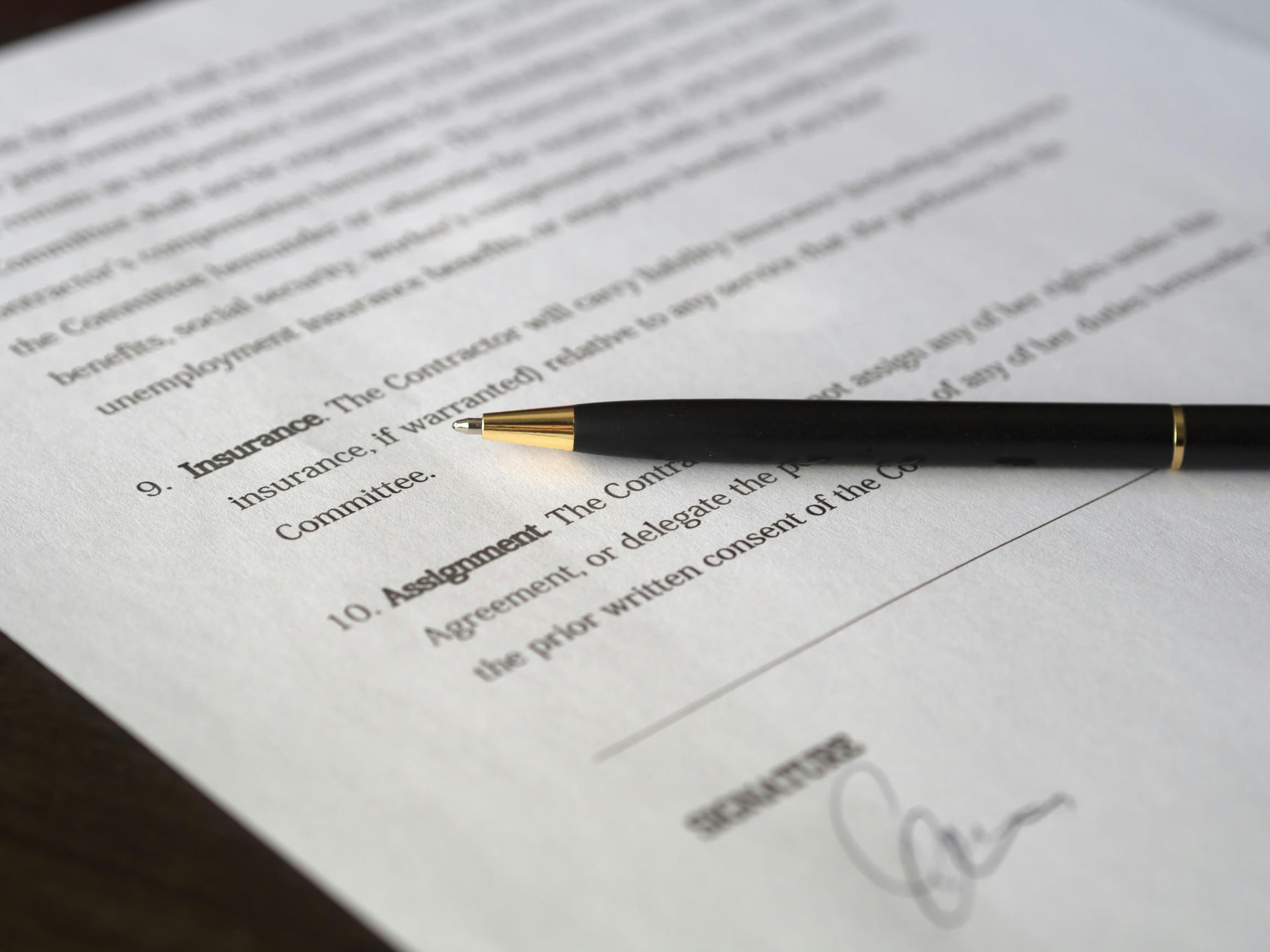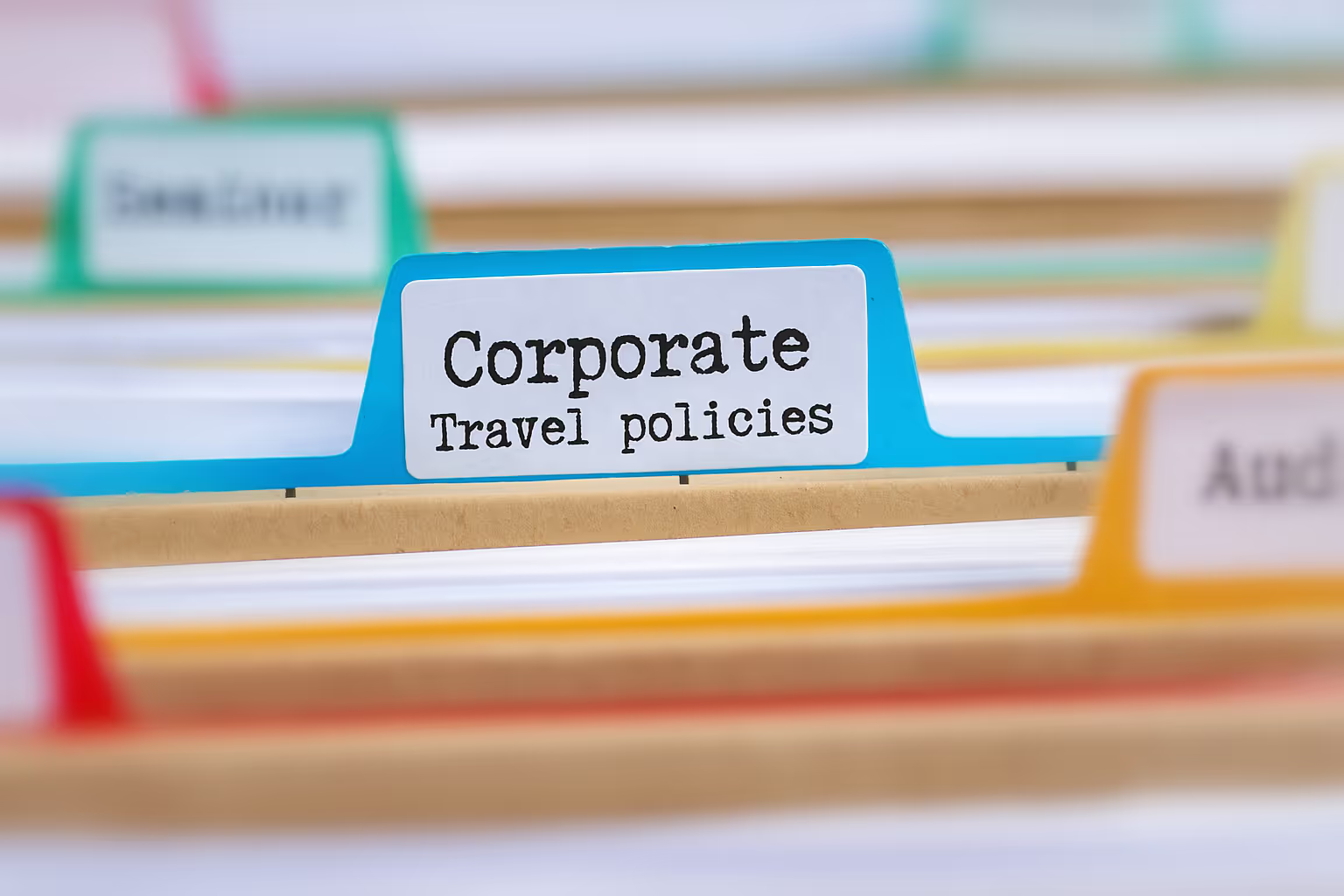Corporate travel policy guide (with template)

Business travel doesn’t need to be complicated. But without clear guidelines, it often is. A well-structured corporate travel policy helps employees stay on budget, book within company standards, and travel with less stress.
Not sure where to start? Use the customizable travel policy template below to build a policy that fits your company’s needs. Whether you're managing a few travelers or hundreds, the right framework helps keep your team focused and their plans on track.
What should you include in a corporate travel policy?
A strong corporate travel policy template sets the foundation for smooth, efficient business travel. It helps your team stay aligned, manage expenses, and avoid confusion about what’s allowed.
Ready to build your own? Start with these essential components.
Policy overview
Kick things off with a clear explanation of the policy’s purpose, who it applies to, and what it’s meant to achieve. This section helps employees understand the "why" behind the rules. With Engine, your team benefits from a streamlined system that blends clarity with structure, making it easy to stay compliant—without the guesswork.
Eligibility for business travel
Not every meeting warrants a flight or hotel stay. Use your corporate travel policy template to define which employees qualify for business travel, when it’s appropriate, and what types of work justify the expense. Centralizing travel approvals with tools like Engine keeps the process clear and consistent.
Qualifying expenses
Eliminate confusion by clearly outlining which expenses you’ll cover for employees—think flights, hotels, meals, and ground transportation. Travel costs have surged in recent years, but Engine helps teams stay within budget by offering cost-effective hotel options and full visibility into spending. Reviewing travel and expense policy samples can help you fine-tune this section for your company’s goals.
Travel booking procedures
Outline the steps for arranging travel, whether through a coordinator, platform, or specific vendor. Include clear instructions that help avoid errors—things like an employee accidentally booking a hotel in the wrong city because they mixed up the travel details. Engine’s platform streamlines this process, allowing comparisons, deal-locking, and organized bookings.
Expense reimbursement process
No one likes navigating a complicated reimbursement system. Use this section to spell out how employees can submit reimbursable expenses, what documentation they need, and when they should expect reimbursement. Engine helps streamline the process with consolidated invoices, so there’s less need to save receipts or wait on multiple approvals.
Want to take it further? Check out our reimbursement policy guide for a deeper dive.
Code of conduct, safety, and duty of care
Establish clear expectations for professional behavior and safety during business travel. This includes guidelines on employee conduct, emergency protocols, and procedures for unforeseen challenges.
Use tools like Engine to monitor travel in real-time, allowing administrators to respond promptly to any issues. For a deeper understanding of ensuring traveler safety and fulfilling your organization's duty of care, refer to our guides on trip risk assessments and corporate travel safety tips.
Corporate travel policy template
This sample company travel policy for employees is designed to help you build a practical and flexible corporate travel policy. Customize each section to reflect your company’s structure, budget, and travel needs.
View our downloadable templates here.
1. Purpose and scope
This travel policy for [employees/contractors/staff] traveling on behalf of [Company Name] is designed to:
- Ensure safe, compliant, and cost-effective travel
- Streamline the booking and approval process
- Promote consistency and reduce confusion
- Support employee well-being during travel
2. Eligibility for business travel
Travel may be approved when it supports:
- Client meetings or project work
- Conferences or industry events
- Internal training or team coordination
All travel must be pre-approved by [Manager/Supervisor/Travel Coordinator].
3. Booking procedures
- Use [specific platform/software] for all travel arrangements to maintain compliance with company standards.
- Pre-approval is required for trips exceeding [$XX] or involving international destinations.
- Transactions must be made with company-approved providers, such as [preferred airlines/hotel chains/car rental services].
- Bookings made outside the approved system will not qualify for reimbursement unless exceptions are granted.
4. Approved and non-approved expenses
Eligible expenses include:
- Economy-class airfare
- Lodging at mid-tier hotels
- Meals within allowance
- Ground transportation (e.g., taxi, rideshare, train)
Non-eligible costs:
- First-class or business-class upgrades
- Entertainment or alcohol
- Personal or companion expenses
- Non-essential purchases
Cost caps and limits apply (e.g., maximum of [$XX]/night for accommodations).
5. Per diem policies
- A daily per diem of [$XX] applies, following [General Services Administration/local] standards.
- Receipts are not required, but total daily expenses must stay within limits.
6. Safety and insurance
- Company-provided travel insurance covers medical emergencies, cancellations, and unforeseen issues on approved trips.
- Employees are expected to comply with local laws and safety advisories.
- Emergency contacts and HR support are available throughout the trip.
7. Approval and reimbursement
- Submit trip plans and cost estimates for approval before booking.
- Reimbursement claims must include original receipts and be submitted within [XX days] of return.
- Approved reimbursements are issued within [XX days].
8. Employee conduct while traveling
- Employees must follow professional conduct guidelines and represent the company positively.
- Respect local customs and comply with all internal and legal regulations.
- Policy violations may lead to disciplinary action.
9. Additional guidelines
- Personal companions: Allowed at traveler’s own expense.
- Cancellations/changes: Notify [designated team/contact] immediately.
- Travel tips: When possible, book flights at least six weeks in advance. Choose refundable fares when available.
This template provides the essential framework for a corporate travel policy. Adapt it as needed to reflect your organization’s policies, goals, and traveler expectations.
Best practices for implementing a travel policy
A good travel policy should make life easier for everyone—not more complicated. The goal is simple: travel smarter, stay organized, and stick to budgets without unnecessary friction.
Here’s how to put your policy into action.
Keep the policy flexible and up-to-date
Business needs evolve, and so should your policy. Regularly review and update it to reflect new budgets, travel goals, and booking practices. A flexible approach keeps employees engaged and compliant.
Simplify booking with smart tools
A centralized platform like Engine streamlines the booking process by bringing flights, hotels, and rentals into one place. It also handles receipts and tracks expenses automatically, saving time and reducing manual work for the travel management team.
Monitor policy compliance
Policies only work if people follow them. Engine offers visibility into compliance, helping you spot trends, flag issues, and make data-backed updates. When travelers know the expectations and have a system that supports them, compliance improves naturally.
Build the rules into the process
Nobody wants to reference a PDF every time they book. And with Engine, they don’t have to. Our platform embeds your policy directly into the booking flow, showing only pre-approved options like preferred hotels or spending limits. Need an exception? The built-in approval process makes it fast and easy, balancing structure with flexibility.
Stay compliant with your business travel policy with Engine
Simplified, compliant travel starts here. Engine brings together booking, expense tracking, and policy enforcement in one centralized platform. Your team only sees options that align with your travel policy—no guesswork, no side-stepping the rules.
Need to make an exception? Engine’s built-in approval process keeps things flexible without losing control.
With real-time tracking and expense reporting tools, you’ll always know who’s booking what, where money’s going, and how your travel program is performing. Managing travel doesn’t have to be a headache—and with Engine, it’s seamless.
Ready to simplify your travel management? Start booking with Engine today.
FAQs
Why is having a company travel policy important?
A clear travel policy sets expectations for work trips, controls business costs, and ensures trips align with company goals. It saves time, reduces confusion, and makes travel easier for everyone involved.
What travel expenses are covered by the company?
Covered expenses typically include airfare, lodging, meals within per diem limits, and ground transportation. Non-essential costs like first-class upgrades, personal purchases, or entertainment are usually not reimbursable. Always refer to the company’s travel policy for the full list of approved expenses.
Do I need to get approval before booking travel?
In most cases, yes. Pre-approval helps ensure trips stay within budget and meet business needs. Employees should always check the company’s travel policy or confirm with their manager before booking.
Can I add personal travel days to a business trip?
Usually, yes—but you’ll need to cover any personal expenses yourself. Make sure to review your travel policy and get approval for any personal extensions before making plans.



.jpg)









.jpg)



.avif)

.avif)


.avif)






.avif)





.avif)





